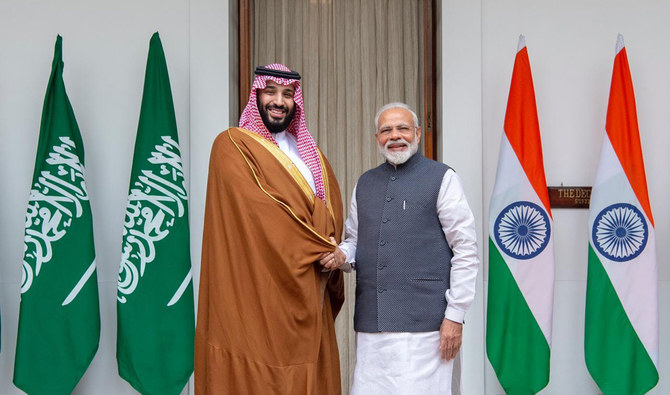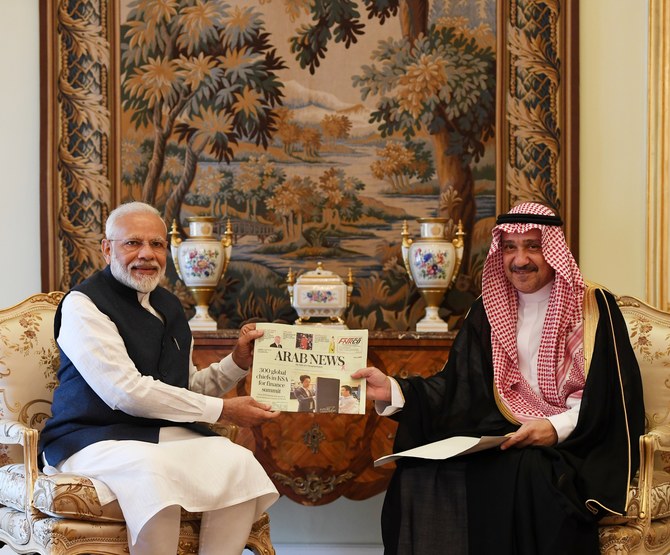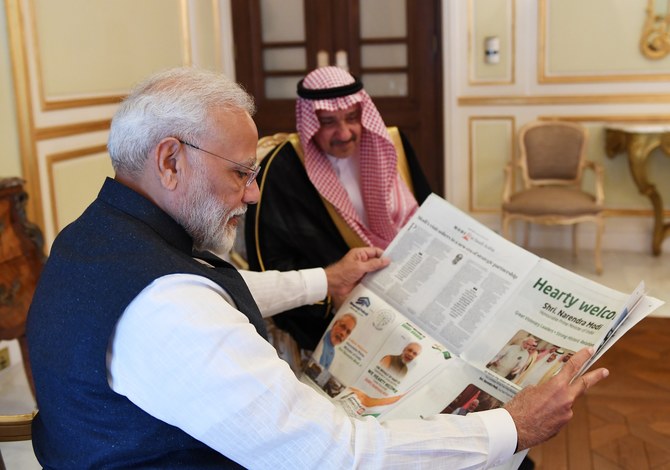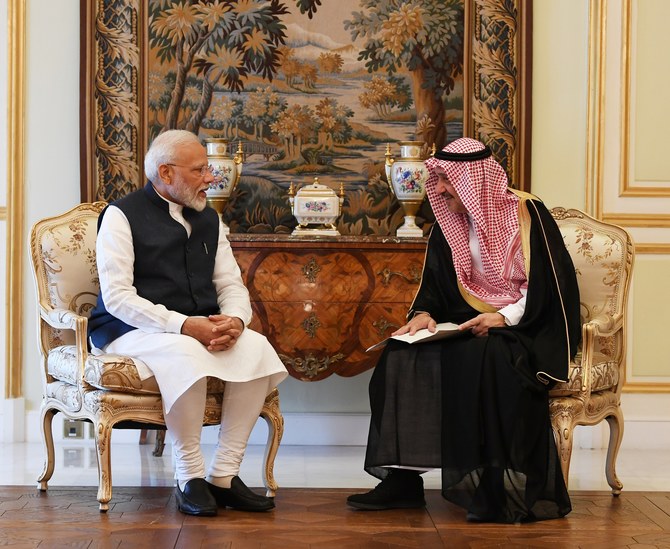RIYADH: On the occasion of his visit to Saudi Arabia, his second in three years, India’s Prime Minister Narendra Modi told Arab News that the two countries have been working together within the G20 to reduce inequality and promote sustainable development.
Modi said with the signing of an agreement on a Strategic Partnership Council, already robust and deep bilateral ties in various fields will only strengthen further.
Saying stable oil prices are crucial for the growth of the global economy, he praised the Kingdom’s role as an important and reliable source of India’s energy requirements.

Indian Prime Minister Narendra Modi with Arab News Deputy Editor-in-Chief Tarek Mishkhas during Modi's visit to the Kingdom. (AN Photo)
Q You met Crown Prince Mohammed bin Salman on many previous occasions on the sidelines of G20 meetings, and during his historic visit to New Delhi last year. Can you tell us about the excellent chemistry that exists between you and him?
A Since my first visit to the Kingdom in 2016, I have personally witnessed a remarkable growth in our bilateral relations. I have met His Royal Highness (HRH) Crown Prince Mohammed bin Salman five times. I recall with warmth my previous meetings with him, and look forward to meeting him again during this visit.
I am confident that under the leadership of His Majesty King Salman and HRH Crown Prince Mohammed bin Salman, bilateral relations between India and Saudi Arabia will only grow stronger.
Q India and Saudi Arabia signed the Riyadh Declaration in 2010 and called it “Toward a New Era in Strategic Partnership.” What has been the progress since then?
A “Neighborhood First” continues to be the guiding vision for my government’s foreign policy. India’s relations with Saudi Arabia are one of the most important bilateral relationships in our extended neighborhood.
The visit of the Custodian of the Two Holy Mosques King Salman, as the crown prince of Saudi Arabia, to India in 2014, my visit to Riyadh in April 2016, and the state visit of HRH Mohammed bin Salman earlier this year in February have further consolidated this special relationship.
During this visit to Saudi Arabia, we are going to sign an agreement on a Strategic Partnership Council, which will begin a new era of cooperation across sectors. Our ties across various dimensions such as trade, investment, security and defense cooperation are robust and deep, and will only strengthen further.
Q Going by media reports, there seems to have been considerable cooperation and coordination between the two countries on security issues. Are you satisfied with the level of cooperation?
A I believe that Asian powers like India and Saudi Arabia share similar security concerns in their neighborhood. In that respect, I am happy that our cooperation, particularly in the field of counterterrorism, security and strategic issues, is progressing very well. My national security adviser just visited Riyadh for a very productive visit.
We have a Joint Committee on Defense Cooperation that holds regular meetings. We have identified a number of areas of mutual interest and cooperation in the field of defense and security. We are also in the process of entering into agreements on security cooperation, collaboration in defense industries, and also agreed to hold a comprehensive security dialogue mechanism between the two countries.
Q The Middle East, or West Asia as the region is known in India, is in turmoil. It is going through one of its worst phases of conflict and violence. What constructive role can India play in reducing tensions in the region?
A We believe that a balanced approach is required to resolve the conflicts, while respecting the principles of sovereignty and non-interference in each other’s internal matters.
India shares excellent bilateral relations with all the countries in the region, and a very large Indian diaspora, numbering over 8 million, resides in the region. A dialogue process that encourages the participation of all stakeholders is important to bring peace and security to this very important region.
Q India and Saudi Arabia are members of the G20. How do you view the global economic outlook?
A The global economic outlook is strongly dependent on the path chartered by the large developing countries such as India. As I mentioned in my speech at the UN General Assembly in September, we sincerely believe that we need collective efforts, for the growth of all, with everyone’s trust.
Economic uncertainty is an offshoot of unbalanced multilateral trade systems. Within the G20, India and Saudi Arabia have been working together to reduce inequality and promote sustainable development. I am happy to note that Saudi Arabia will be hosting the G20 Summit next year and India will host it in 2022, which is also the 75th anniversary of our independence.
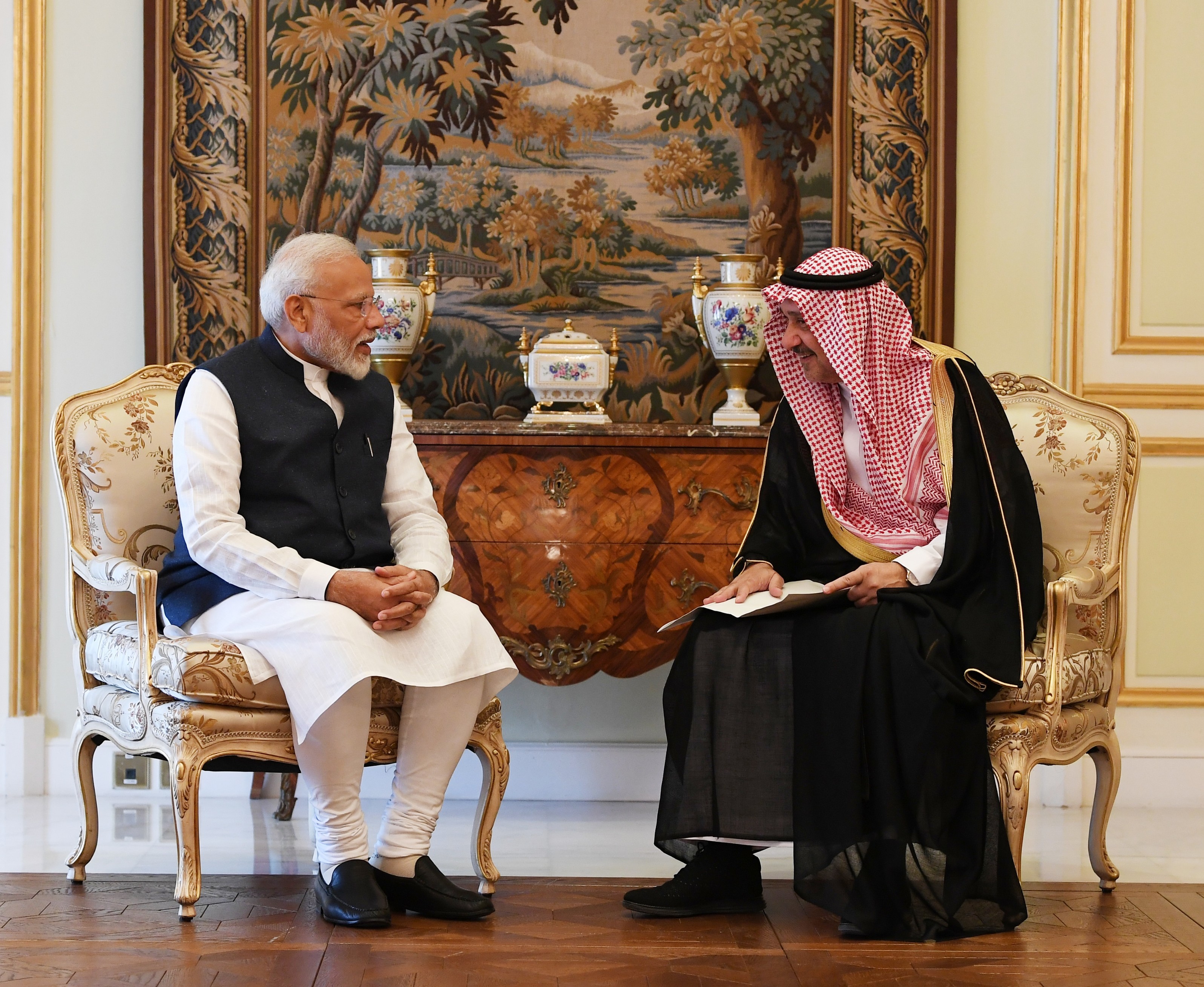
Indian Prime Minister Narendra Modi with Arab News Deputy Editor-in-Chief Tarek Mishkhas during Modi's visit to the Kingdom. (AN Photo)
Q Western economies are still sluggish. In such a bleak scenario, what can Asian countries, including Saudi Arabia and India, do to mitigate the effects of the global economic downturn?
A India has undertaken many reforms to create a business-friendly environment, and to ensure that we remain a major driver of global growth and stability. Our reforms for ease of doing business and introducing investor-friendly initiatives have contributed to improving our position in the World Bank’s Ease of Doing Business Index from 142 in 2014 to 63 in 2019.
A number of major flagship initiatives, like Make in India, Digital India, Skill India, Swatchh Bharat, Smart Cities and Startup India, are offering a lot of opportunities to foreign investors. Similarly, I am happy to note that Saudi Arabia too has embarked upon a reform program as part of their Vision 2030.
Q Saudi Arabia is a leading supplier of oil to India. Low prices are good news for India, and Saudi Arabia wants to retain its market share. How can the two countries integrate these two aspects for a mutually beneficial, long-term energy relationship?
A India imports around 18 percent of its crude oil from the Kingdom, making it the second-largest source of crude oil for us. From a purely buyer-seller relationship, we are now moving toward a closer strategic partnership that will include Saudi investments in downstream oil and gas projects.
We value the Kingdom’s vital role as an important and reliable source of our energy requirements. We believe that stable oil prices are crucial for the growth of the global economy, particularly for developing countries. Saudi Aramco is participating in a major refinery and petrochemical project on India’s west coast. We are also looking forward to the participation of Aramco in India’s Strategic Petroleum Reserves.
Q India is building smart cities and Saudi Arabia has considerable experience, having successfully built smart cities in Yanbu, Jubail and Rabigh. Would you be willing to invite Saudis to help with those massive smart city projects announced by your government?
A One of the major areas of cooperation between India and Saudi Arabia is in investments in our infrastructure projects. During his visit to India in February 2019, the crown prince had indicated an intent to invest in excess of $100 billion in India across various sectors.
We welcome greater Saudi investments in our infrastructure projects, including the Smart Cities program. We also welcome Saudi interest in investing in the National Investment and Infrastructure Fund.
Q Which areas, other than energy, can and should India and Saudi Arabia cooperate in? Are there any specific proposals?
A I am happy to share with you that during my visit this time, India and Saudi Arabia plan to enter into agreements in various areas, including defense, security, renewable energy etc.
Other major initiatives include the proposal to launch the RuPay card in the Kingdom, which will facilitate payments and remittances by the Indian diaspora; integration of the e-Migrate and e-Thawtheeq portals, which will facilitate the process of migration of Indian labor into the Kingdom; and an agreement on training diplomats in our respective academies.
India is known for its world-class capacity-building centers, and there are many initiatives to provide training to the Saudi youth in different fields. We are also discussing mutual cooperation in the field of space research.
Q What is your message to the Indian diaspora in Saudi Arabia?
A Nearly 2.6 million Indians have made Saudi Arabia their second home, contributing to its growth and development. Many Indians also visit the Kingdom every year for the Hajj and Umrah pilgrimage, and for business purposes.
My message to my fellow citizens is that your country is proud of the place that you have made for yourself in the Kingdom, and your hard work and commitment have helped to generate a lot of goodwill for the overall bilateral relationship.
I am confident that you will continue to remain the binding force in our ties with the Kingdom, and further contribute to the strengthening of the historic ties between the two countries, which are based on people-to-people contacts over several decades.


